Removal Procedure
- Disable the SIR system. Refer to Disabling the SIR System in SIR.
- Remove the steering wheel, if necessary. Refer to Steering Wheel Replacement .
- Remove the knee bolster. Refer to Knee Bolster Replacement in Instrument Panel, Gauges and Console.
- Loosen the 2 upper steering column mounting bolts.
- Slightly lower the steering column.
- Remove the 5 screws from the lower steering column cover (2) in order to remove the upper cover (1) and the lower cover (2).
- Remove the turn signal switch and the SIR coil (2) from the steering column. Refer to Inflatable Restraint Steering Wheel Module Coil Replacement in SIR.
- Disconnect all of the ignition wiring connectors at the junction block.
- Pull the forward section of the driver side floor carpet back.
- Remove the steering shaft coupling cover (1).
- Remove the bolt that retains the upper steering shaft coupling (2).
- Separate the steering shaft from the coupling.
- Remove the lower steering column mounting nuts.
- Remove the upper steering column mounting bolts.
- Lower the steering column.
- If the vehicle has an automatic transaxle, remove the screw in order to remove the shift interlock cable (2) from the ignition switch. Refer to Interlock Cable Replacement in Automatic Transmission - 3 Speed - M60.
- Remove the steering column from the vehicle.
- Remove the ignition switch from the steering column, if necessary. Refer to Ignition Switch Replacement - On Vehicle .
Caution: This vehicle is equipped with a Supplemental Inflatable Restraint (SIR) System. Failure to follow the correct procedure could cause the following conditions:
• Air bag deployment • Personal injury • Unnecessary SIR system repairs • Refer to SIR Component Views in order to determine if you are performing service on or near the SIR components or the SIR wiring. • If you are performing service on or near the SIR components or the SIR wiring, disable the SIR system. Refer to Disabling the SIR System.
Notice: The front wheels of the vehicle must be maintained in the straight ahead position and the steering column must be in the LOCK position before disconnecting the steering column or intermediate shaft. Failure to follow these procedures will cause improper alignment of some components during installation and result in damage to the SIR coil assembly.
Important: If you are servicing the steering column or any column-mounted component, remove the steering wheel. If you are removing the steering column in order to attain access to the instrument panel components, leave the steering wheel on the column.
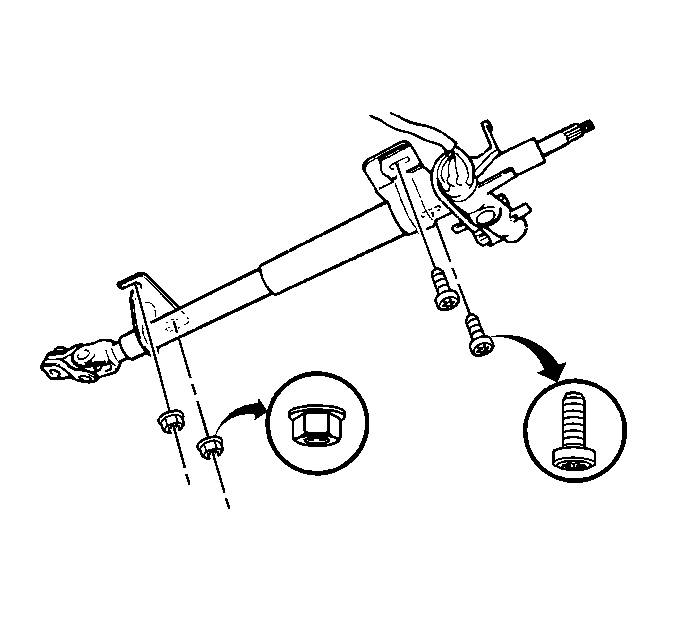
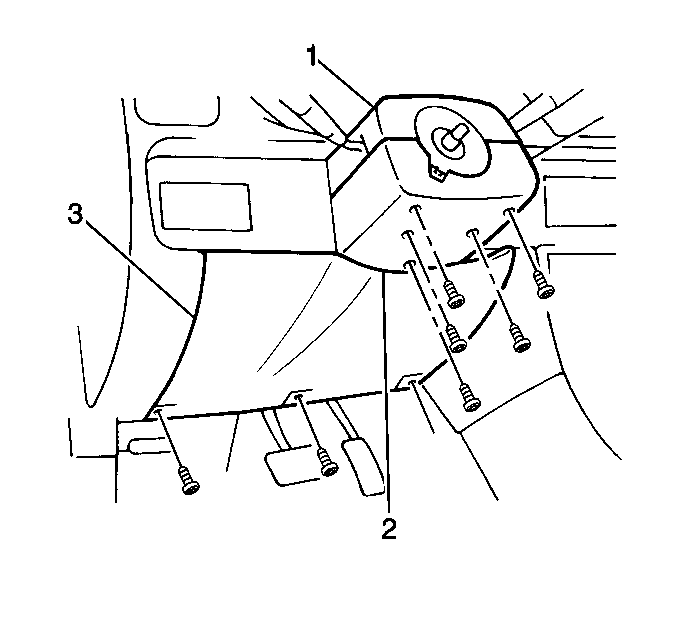
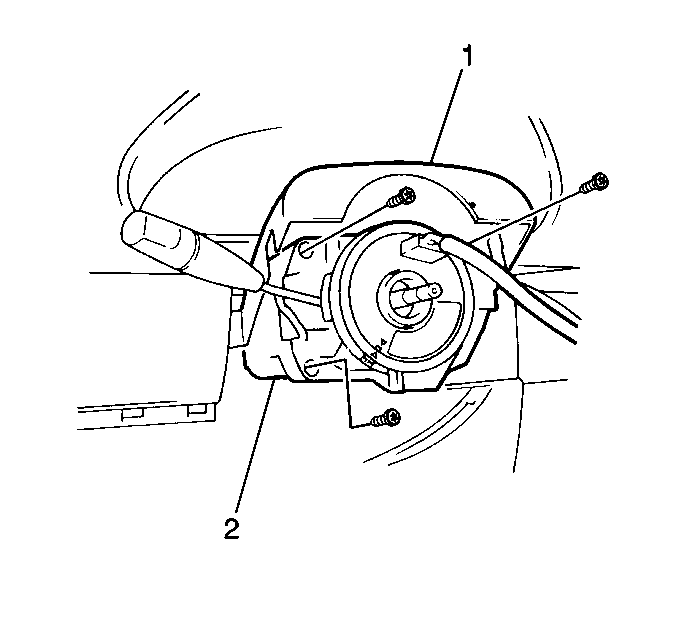
Important: In the event that deployment occurs, inspect the SIR coil and the coil wire for damage. If you find damage to the SIR coil or to the coil wire, replace the SIR coil. Refer to Inflatable Restraint Steering Wheel Module Coil Replacement in SIR.
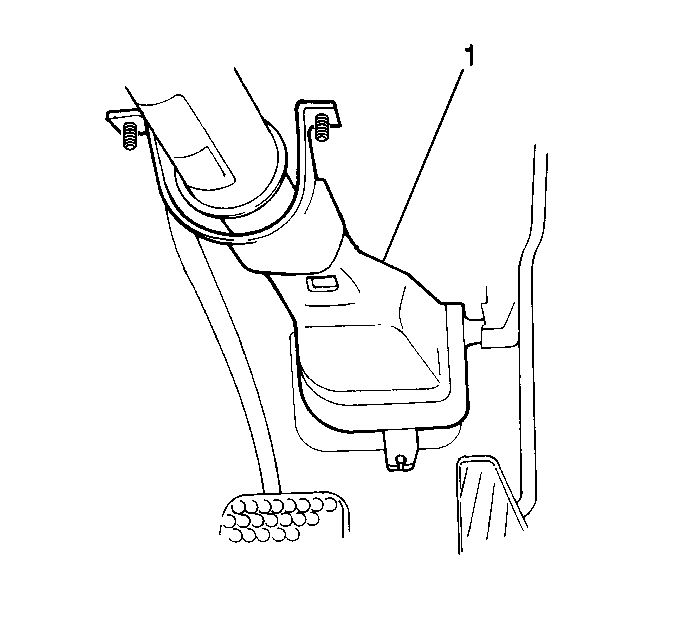
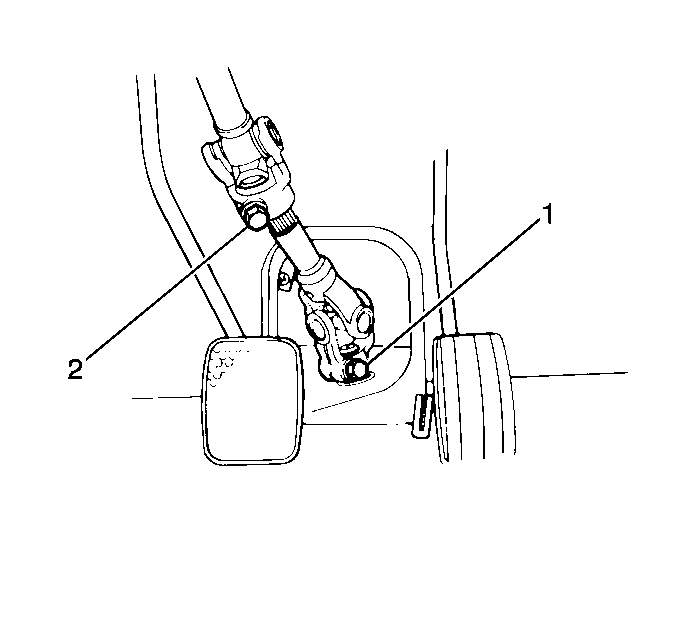

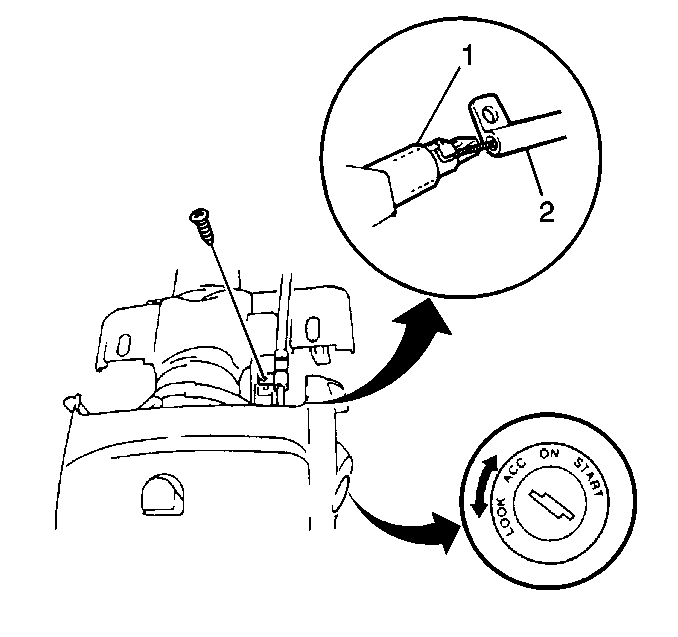
Notice: Once the steering column is removed from the vehicle, the column is extremely susceptible to damage. Dropping the column assembly on the end could collapse the steering shaft or loosen the plastic injections, which maintain column rigidity. Leaning on the column assembly could cause the jacket to bend or deform. Any of the above damage could impair the columns collapsible design. Do NOT hammer on the end of the shaft, because hammering could loosen the plastic injections, which maintain column rigidity. If you need to remove the steering wheel, refer to the Steering Wheel Replacement procedure in this section.
Installation Procedure
- Install the ignition switch to the steering column, if necessary. Refer to Ignition Switch Replacement - On Vehicle .
- Position the steering column under the instrument panel.
- Align the flat section of the steering shaft lower spline (1) with the pinch bolt hole in the steering shaft coupling (2).
- Install the steering shaft (4) to the steering shaft coupling (2).
- Secure the steering shaft coupling with the bolt (2). DO NOT completely tighten the bolt.
- If the vehicle has an automatic transaxle, install the shift interlock cable (2) to the ignition switch. Refer to Interlock Cable Replacement in Automatic Transmission - 3 Speed - M60.
- Tighten the 2 nuts that retain the lower steering column.
- Tighten the bolt (2) that retains the steering shaft coupling.
- Install the steering shaft coupling cover (1).
- Reposition the driver side floor carpet.
- Connect all of the ignition wiring connectors at the junction block.
- Install the turn signal switch and the SIR coil (2) to the steering column, if necessary. Refer to Inflatable Restraint Steering Wheel Module Coil Replacement in SIR.
- Install the upper steering column cover (1) and the lower steering column cover (2).
- Secure the steering column covers with the 5 screws.
- Tighten the 2 bolts that retain the upper steering column.
- Install the knee bolster (3). Refer to Knee Bolster Replacement in Instrument Panel, Gauges and Console.
- Install the steering wheel, if necessary. Refer to Steering Wheel Replacement .
- Enable the SIR. Refer to Enabling the SIR System in SIR.
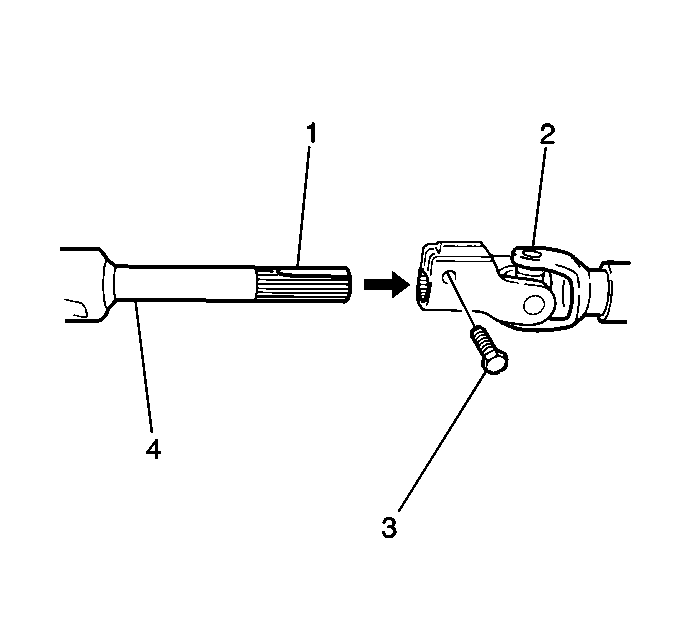
Important: Do not service the steering shaft and the steering column separately. If you find damage to the steering shaft or to the steering column, replace the steering column as an assembly.


Caution: In order to ensure the intended function of the steering
column in a vehicle during a crash and in order to avoid personal injury to
the driver, perform the following:
• Tighten the steering column lower fasteners before you tighten
the steering column upper fasteners. Failure to do this can damage the steering
column. • Tighten the steering column fasteners to the specified torque.
Overtightening the upper steering column fasteners could affect the steering
column collapse.
Notice: Use the correct fastener in the correct location. Replacement fasteners must be the correct part number for that application. Fasteners requiring replacement or fasteners requiring the use of thread locking compound or sealant are identified in the service procedure. Do not use paints, lubricants, or corrosion inhibitors on fasteners or fastener joint surfaces unless specified. These coatings affect fastener torque and joint clamping force and may damage the fastener. Use the correct tightening sequence and specifications when installing fasteners in order to avoid damage to parts and systems.
Tighten
Tighten the nuts to 14 N·m (10 lb ft).

Tighten
Tighten the bolt to 25 N·m (18 lb ft).




Tighten
Tighten the bolts to 14 N·m (10 lb ft).

